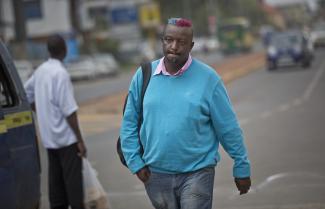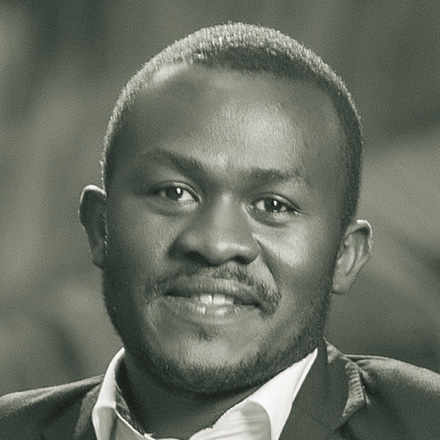Interview
“We need advocates from the West”

How does the situation in Uganda affect your country?
People in Kenya do not have much detailed information on Uganda. But since the Ugandan president signed the anti-homosexuality bill, quite a number of LGBT-people have fled to Kenya, and some have been received by the UNHCR. Many of them hope to get asylum overseas – in Europe, the USA and Canada.
Why don’t they want to stay in Kenya?
Some members of the Kenyan parliament appreciate the Ugandan policy, and they have begun to demand that our country passes even harsher laws than Uganda. So any LGBT person who lives in Kenya visibly is at risk in principle. One refugee told me that he crossed over from Uganda to Kenya in a border town called Busia with two other persons. He is staying with relatives on the Kenyan side. They don’t know that he and his friends are gay. So far, LGBT people have neither been attacked nor threatened, but one has to be careful. The situation is difficult in Kenya too.
Are there support networks for LGBT people in Kenya?
The Gay and Lesbian Coalition of Kenya (GALCK) is well known, and it is doing all it can to receive refugees and direct them to the UNHCR, which can help them to travel on to western countries.
Shortly after Museveni signed the bill a tabloid published the names and pictures of 200 alleged homosexuals. The situation in Uganda looks very volatile.
Yes, it certainly is dangerous. Whether in Uganda or Kenya, everybody was waiting with bated breath for the action the Ugandan president was going to take. We knew that, if he signed the law, many people would be in danger – not only LGBT people, but anyone who supports them as well. Not everybody has the courage to stay in the country now. Moreover, it has not been forgotten that David Kato, a LGBT activist, was tortured and murdered in Kampala in 2011. His was a very cruel, painful death. People certainly have reason to escape from Uganda.
Binyavanga Wainaina is a well-known Kenyan writer. In January, he published a "lost chapter" to his autobiography on the internet. The title is:
"I am a homosexual, mum". Did that spark some kind of public debate?
I have met Wainaina personally after he came out. Many homophobic people feel that he should not have come out, that he should have stayed in the closet. They say he is encouraging people to become homosexual. But that is not the case. Nobody becomes homosexual because someone else has come out. They also say that being gay is against African culture. That is another lie. There are gay people all over the world. Activists like us think that Wainaina has done a good thing, but I do not know how safe he will be if the debate heats up in Kenya’s parliament.
How was homosexuality dealt with in Kenya before colonialism?
Both homosexuality and heterosexuality were common in Kenya and many other parts of sub-Saharan Africa. There was no penalty for anybody who was found to be gay. The reason was that the person concerned was not breaking anyone’s bones. At worst, homosexuality was considered a minor form of misconduct. The issue was simply left alone, at least if the persons were not married. In any case, being homosexual was not a big issue.
You have been an Anglican priest since 1979. After studying pastoral care and counselling in the USA, you explicitly invited LGBT people to your church and founded "Other Sheep Africa". In 2007, the Anglican Archbishop of Kenya, Benjamin Nzimbi, told you to step aside, because he didn’t want you to talk about homosexuality …
Yes, I stepped out and stayed out of the Anglican Church, but the ministry of "Other Sheep" has grown. What we do is we persuade religious leaders and pastors to come to seminars where we help them understand what the bible says about homosexuality and what it doesn’t say. We also talk about homosexuality and the African culture. We talk about homosexuality and science. We help church leaders of various denominations to understand that homosexuality is neither a sickness nor a sin. Abusive sex is a sin – whether it is homosexual or heterosexual. Loving relationships, however, are not sinful. We also reach out to Muslim faith leaders.
What do you tell them?
We ask them: As a Muslim religious leader, are you supposed to promote revenge or promote mercy? And a lot of them agree that, according to the Koran, those who show mercy are more blessed than those who take revenge. So we ask them: why are you not showing mercy to gay and lesbian Muslims? Moreover, we point out that religious scriptures like the Bible and Koran have to be read in context. One has to ask oneself: why was this said? To whom? And what does that mean today? Typically, close examination reveals that the holy scriptures do not comment much on homosexuality, and where they do, they don’t speak of loving relationships and the homosexual orientation as we know it today. Both Muslim and Christian faith leaders can see that the holy scriptures do not condemn homosexuality as such.
What arguments are you being confronted with?
One key misconception is that homosexuality is seen only as a sexual act. Homophobic people say it is a bad choice that is influenced by someone else. They believe that everybody is born heterosexual. We do our best to make them see the difference between sexual orientation and the sexual act. Nobody can be seduced to change their sexual orientation. Another thing our critics often come up with is that we get financial support from America and Europe, which, in their eyes, implies that we are promoting alien cultures in Africa. In return, we ask them: how many other activities are being funded with western money in Kenya? There are so many, and many of them are good. And why should fundamentalist religious voices from the USA or Saudi Arabia be somehow more African than those that speak out against the marginalisation and discrimination of sexual minorities?
Are you happy with the support you get from the western countries?
We need more progressive advocates from the West coming to Africa. Conservative missionaries are coming in big numbers. They have lost the debate in North America and Europe, but they come to Uganda and other countries to manipulate Africans and promote homophobia. If they can do that, why can’t the progressives counteract that? We deserve support.
Is there something the west should do differently?
Our organisation advises people who come from the west not to promote same-sex marriage, but rather the equality of the sexes and the equality of sexual orientations. Moreover, we invite them to tell us about the history of the struggle for gay rights in their countries. I benefited a lot, when I was in Berlin in 2012, where we went to the Holocaust memorial and learned about the persecution of homosexuals in Nazi-Germany. Most of the churches in Africa have sister denominations in Europe and America. Often, these churches appreciate LGBT people’s rights. It would be very helpful if faith leaders from these churches came here and gave account of how gay people suffer because of homophobia. But that hardly happens, and it certainly does not happen often enough.
What is wrong with promoting gay marriage?
Well, when US President Barack Obama speaks about gay rights, the whole debate is just about where gay marriage is possible. The West is quite advanced. Many Africans, however, think that Obama wants to force men to marry men and women to marry women. Our top priority must be to have all LGBT people being safely visible. Homosexual marriage comes later. Maybe the issue will come up some time in the next 25 years. What we need first is awareness raising about sexual orientation being a personal characteristic that is not manipulated by anyone and that does not harm anyone. We need sex education that enlightens people about these things.
Questions by Friederike Wyrwich.
The Reverend Michael N. Kimindu is the founder of "Other Sheep Africa ".
mnk24@yahoo.com
http://othersheepafrika-kenya.org/











